Case Study of Mark: Trauma Informed Care and Substance Abuse
VerifiedAdded on 2023/01/19
|11
|3135
|73
AI Summary
This case study explores the use of trauma informed care in addressing substance abuse issues in a patient named Mark. It discusses the factors that led to problematic substance abuse and the role of mental health professionals in providing quality care. The study also highlights the importance of collaboration and empowerment in achieving personal recovery.
Contribute Materials
Your contribution can guide someone’s learning journey. Share your
documents today.
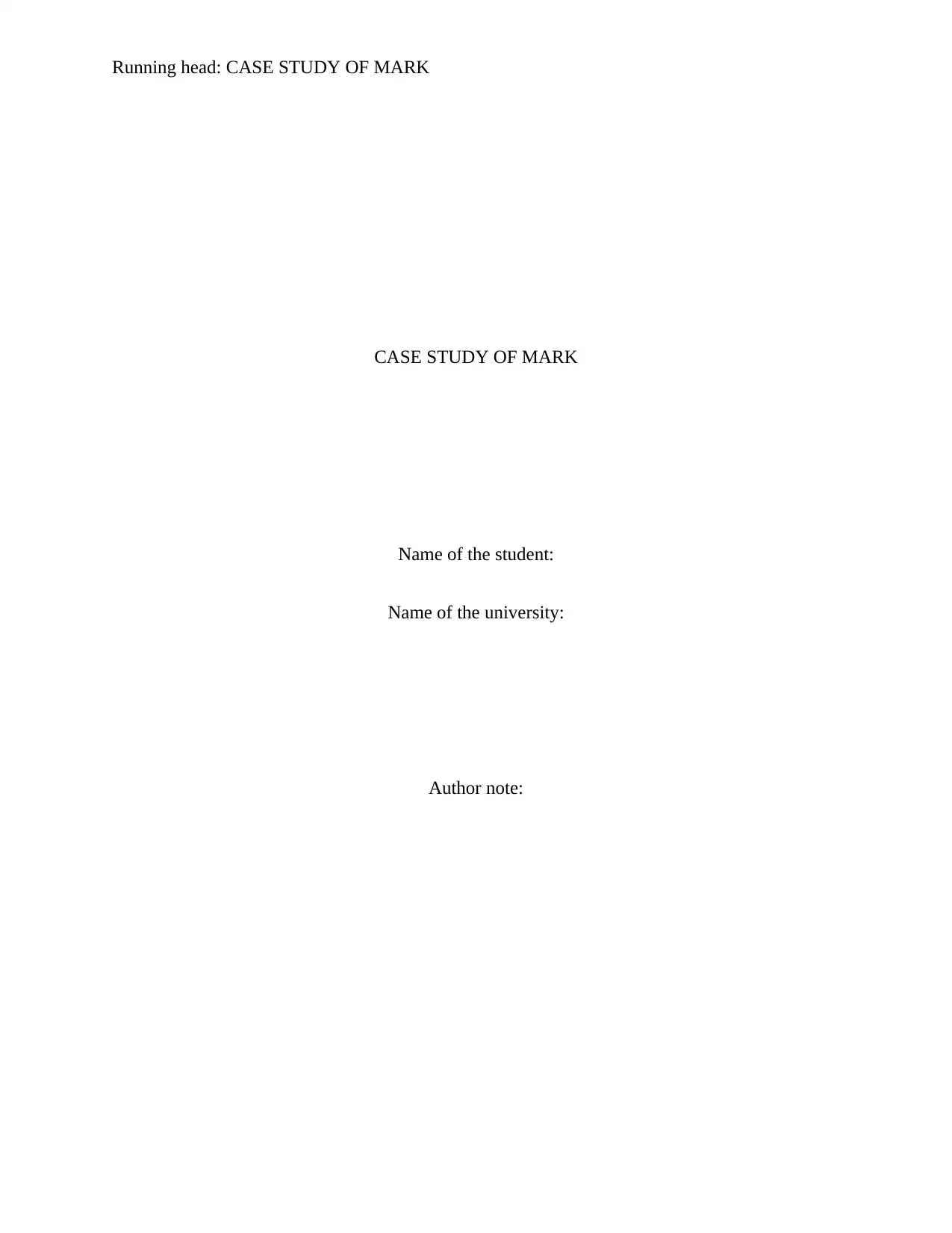
Running head: CASE STUDY OF MARK
CASE STUDY OF MARK
Name of the student:
Name of the university:
Author note:
CASE STUDY OF MARK
Name of the student:
Name of the university:
Author note:
Secure Best Marks with AI Grader
Need help grading? Try our AI Grader for instant feedback on your assignments.
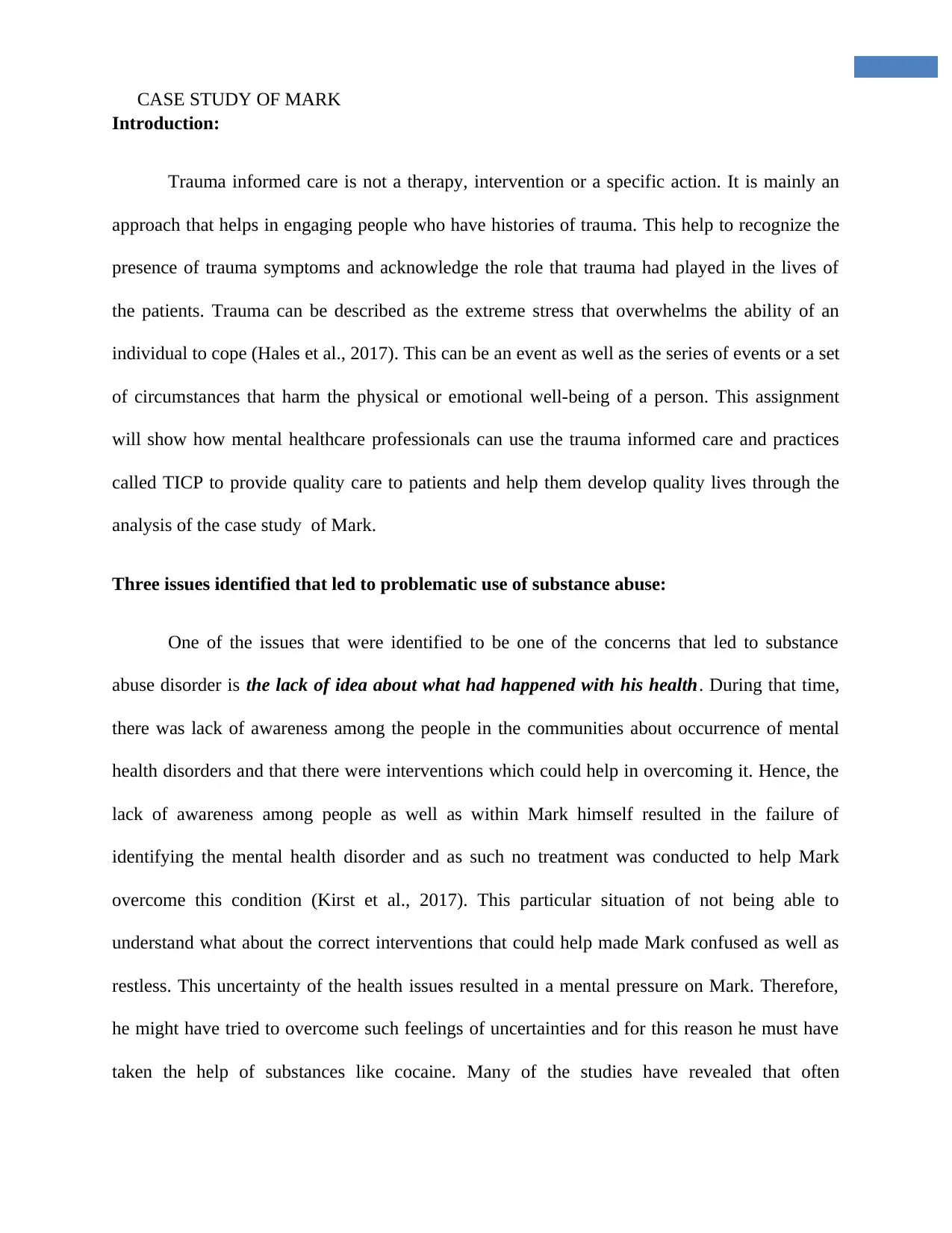
1
CASE STUDY OF MARK
Introduction:
Trauma informed care is not a therapy, intervention or a specific action. It is mainly an
approach that helps in engaging people who have histories of trauma. This help to recognize the
presence of trauma symptoms and acknowledge the role that trauma had played in the lives of
the patients. Trauma can be described as the extreme stress that overwhelms the ability of an
individual to cope (Hales et al., 2017). This can be an event as well as the series of events or a set
of circumstances that harm the physical or emotional well-being of a person. This assignment
will show how mental healthcare professionals can use the trauma informed care and practices
called TICP to provide quality care to patients and help them develop quality lives through the
analysis of the case study of Mark.
Three issues identified that led to problematic use of substance abuse:
One of the issues that were identified to be one of the concerns that led to substance
abuse disorder is the lack of idea about what had happened with his health. During that time,
there was lack of awareness among the people in the communities about occurrence of mental
health disorders and that there were interventions which could help in overcoming it. Hence, the
lack of awareness among people as well as within Mark himself resulted in the failure of
identifying the mental health disorder and as such no treatment was conducted to help Mark
overcome this condition (Kirst et al., 2017). This particular situation of not being able to
understand what about the correct interventions that could help made Mark confused as well as
restless. This uncertainty of the health issues resulted in a mental pressure on Mark. Therefore,
he might have tried to overcome such feelings of uncertainties and for this reason he must have
taken the help of substances like cocaine. Many of the studies have revealed that often
CASE STUDY OF MARK
Introduction:
Trauma informed care is not a therapy, intervention or a specific action. It is mainly an
approach that helps in engaging people who have histories of trauma. This help to recognize the
presence of trauma symptoms and acknowledge the role that trauma had played in the lives of
the patients. Trauma can be described as the extreme stress that overwhelms the ability of an
individual to cope (Hales et al., 2017). This can be an event as well as the series of events or a set
of circumstances that harm the physical or emotional well-being of a person. This assignment
will show how mental healthcare professionals can use the trauma informed care and practices
called TICP to provide quality care to patients and help them develop quality lives through the
analysis of the case study of Mark.
Three issues identified that led to problematic use of substance abuse:
One of the issues that were identified to be one of the concerns that led to substance
abuse disorder is the lack of idea about what had happened with his health. During that time,
there was lack of awareness among the people in the communities about occurrence of mental
health disorders and that there were interventions which could help in overcoming it. Hence, the
lack of awareness among people as well as within Mark himself resulted in the failure of
identifying the mental health disorder and as such no treatment was conducted to help Mark
overcome this condition (Kirst et al., 2017). This particular situation of not being able to
understand what about the correct interventions that could help made Mark confused as well as
restless. This uncertainty of the health issues resulted in a mental pressure on Mark. Therefore,
he might have tried to overcome such feelings of uncertainties and for this reason he must have
taken the help of substances like cocaine. Many of the studies have revealed that often
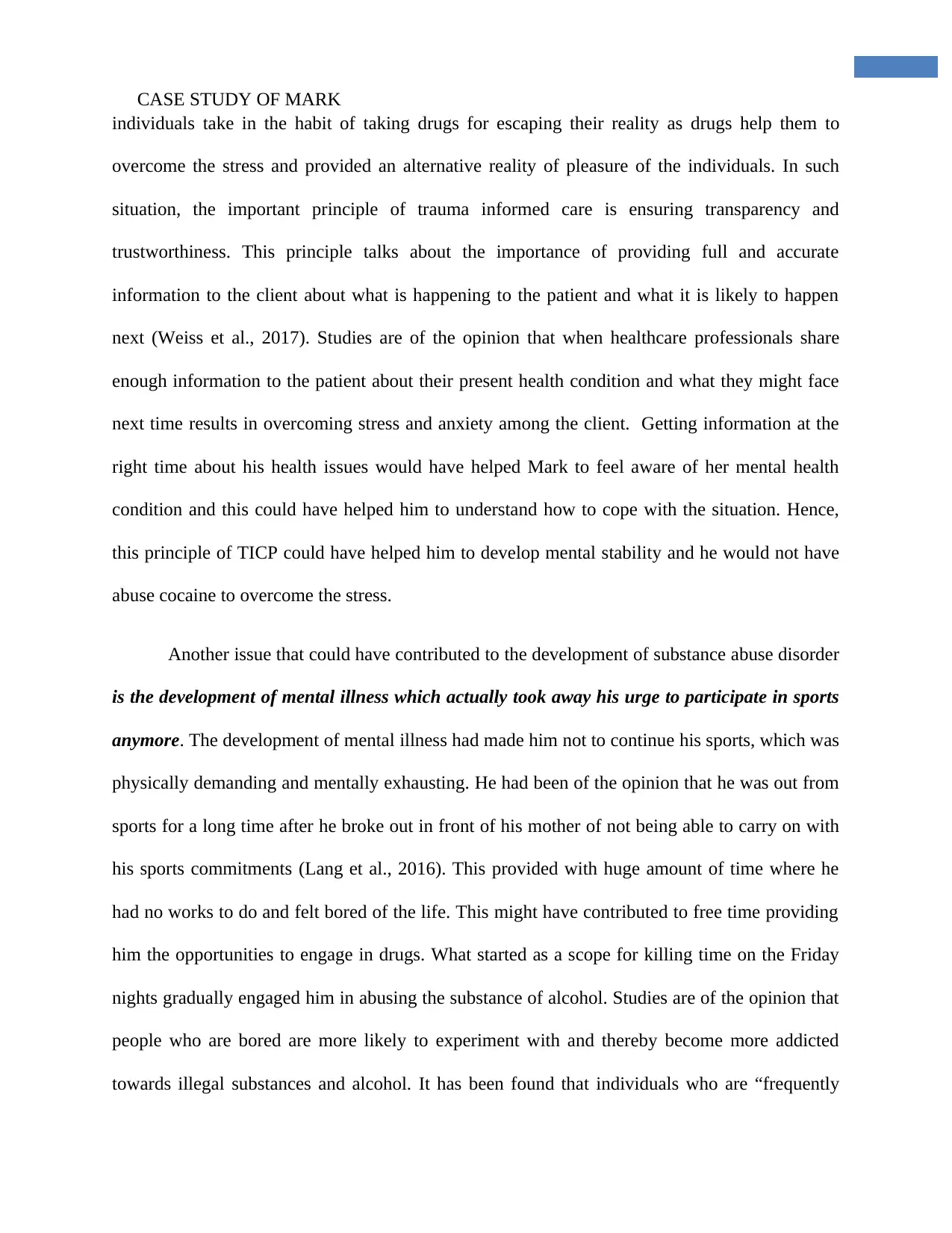
2
CASE STUDY OF MARK
individuals take in the habit of taking drugs for escaping their reality as drugs help them to
overcome the stress and provided an alternative reality of pleasure of the individuals. In such
situation, the important principle of trauma informed care is ensuring transparency and
trustworthiness. This principle talks about the importance of providing full and accurate
information to the client about what is happening to the patient and what it is likely to happen
next (Weiss et al., 2017). Studies are of the opinion that when healthcare professionals share
enough information to the patient about their present health condition and what they might face
next time results in overcoming stress and anxiety among the client. Getting information at the
right time about his health issues would have helped Mark to feel aware of her mental health
condition and this could have helped him to understand how to cope with the situation. Hence,
this principle of TICP could have helped him to develop mental stability and he would not have
abuse cocaine to overcome the stress.
Another issue that could have contributed to the development of substance abuse disorder
is the development of mental illness which actually took away his urge to participate in sports
anymore. The development of mental illness had made him not to continue his sports, which was
physically demanding and mentally exhausting. He had been of the opinion that he was out from
sports for a long time after he broke out in front of his mother of not being able to carry on with
his sports commitments (Lang et al., 2016). This provided with huge amount of time where he
had no works to do and felt bored of the life. This might have contributed to free time providing
him the opportunities to engage in drugs. What started as a scope for killing time on the Friday
nights gradually engaged him in abusing the substance of alcohol. Studies are of the opinion that
people who are bored are more likely to experiment with and thereby become more addicted
towards illegal substances and alcohol. It has been found that individuals who are “frequently
CASE STUDY OF MARK
individuals take in the habit of taking drugs for escaping their reality as drugs help them to
overcome the stress and provided an alternative reality of pleasure of the individuals. In such
situation, the important principle of trauma informed care is ensuring transparency and
trustworthiness. This principle talks about the importance of providing full and accurate
information to the client about what is happening to the patient and what it is likely to happen
next (Weiss et al., 2017). Studies are of the opinion that when healthcare professionals share
enough information to the patient about their present health condition and what they might face
next time results in overcoming stress and anxiety among the client. Getting information at the
right time about his health issues would have helped Mark to feel aware of her mental health
condition and this could have helped him to understand how to cope with the situation. Hence,
this principle of TICP could have helped him to develop mental stability and he would not have
abuse cocaine to overcome the stress.
Another issue that could have contributed to the development of substance abuse disorder
is the development of mental illness which actually took away his urge to participate in sports
anymore. The development of mental illness had made him not to continue his sports, which was
physically demanding and mentally exhausting. He had been of the opinion that he was out from
sports for a long time after he broke out in front of his mother of not being able to carry on with
his sports commitments (Lang et al., 2016). This provided with huge amount of time where he
had no works to do and felt bored of the life. This might have contributed to free time providing
him the opportunities to engage in drugs. What started as a scope for killing time on the Friday
nights gradually engaged him in abusing the substance of alcohol. Studies are of the opinion that
people who are bored are more likely to experiment with and thereby become more addicted
towards illegal substances and alcohol. It has been found that individuals who are “frequently
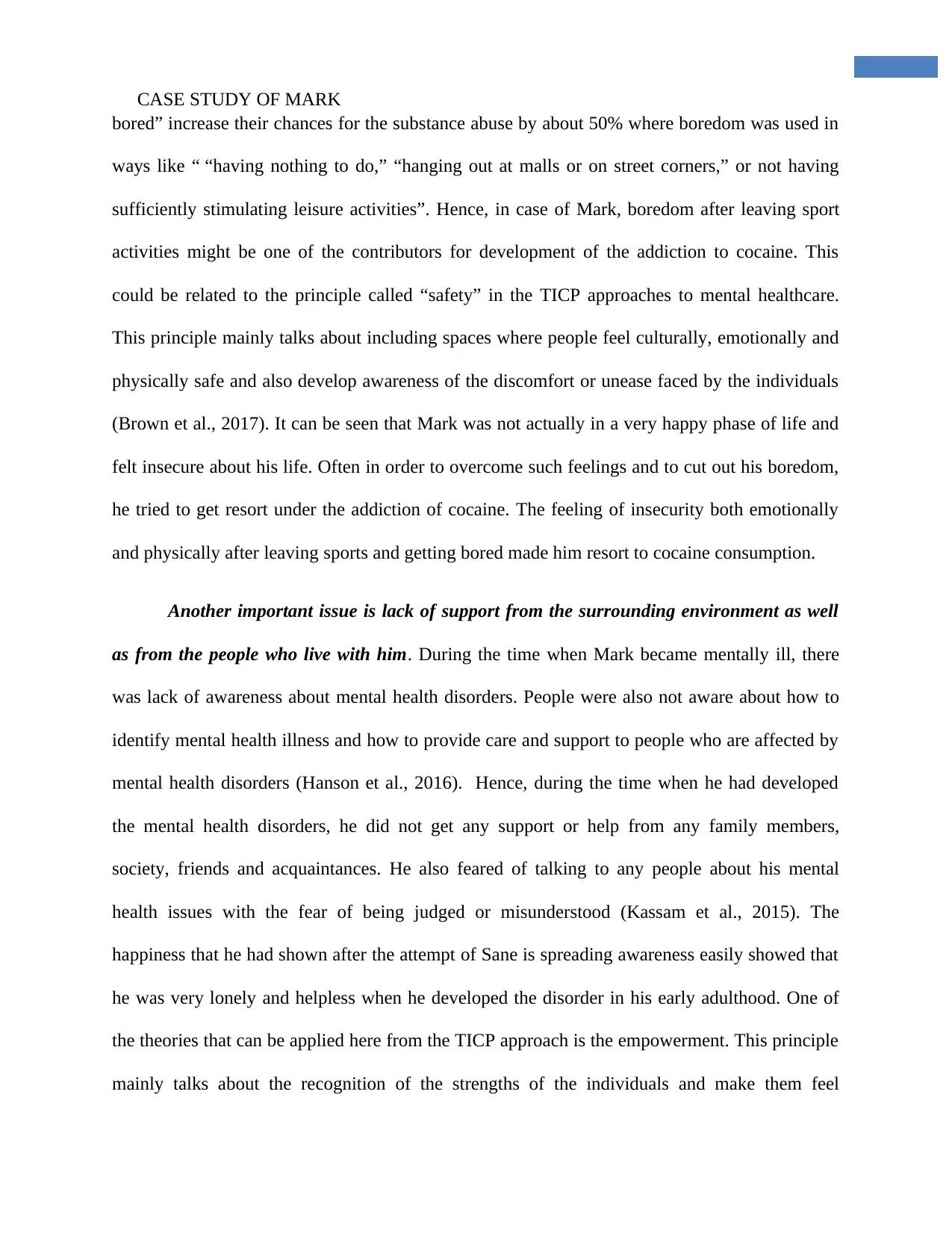
3
CASE STUDY OF MARK
bored” increase their chances for the substance abuse by about 50% where boredom was used in
ways like “ “having nothing to do,” “hanging out at malls or on street corners,” or not having
sufficiently stimulating leisure activities”. Hence, in case of Mark, boredom after leaving sport
activities might be one of the contributors for development of the addiction to cocaine. This
could be related to the principle called “safety” in the TICP approaches to mental healthcare.
This principle mainly talks about including spaces where people feel culturally, emotionally and
physically safe and also develop awareness of the discomfort or unease faced by the individuals
(Brown et al., 2017). It can be seen that Mark was not actually in a very happy phase of life and
felt insecure about his life. Often in order to overcome such feelings and to cut out his boredom,
he tried to get resort under the addiction of cocaine. The feeling of insecurity both emotionally
and physically after leaving sports and getting bored made him resort to cocaine consumption.
Another important issue is lack of support from the surrounding environment as well
as from the people who live with him. During the time when Mark became mentally ill, there
was lack of awareness about mental health disorders. People were also not aware about how to
identify mental health illness and how to provide care and support to people who are affected by
mental health disorders (Hanson et al., 2016). Hence, during the time when he had developed
the mental health disorders, he did not get any support or help from any family members,
society, friends and acquaintances. He also feared of talking to any people about his mental
health issues with the fear of being judged or misunderstood (Kassam et al., 2015). The
happiness that he had shown after the attempt of Sane is spreading awareness easily showed that
he was very lonely and helpless when he developed the disorder in his early adulthood. One of
the theories that can be applied here from the TICP approach is the empowerment. This principle
mainly talks about the recognition of the strengths of the individuals and make them feel
CASE STUDY OF MARK
bored” increase their chances for the substance abuse by about 50% where boredom was used in
ways like “ “having nothing to do,” “hanging out at malls or on street corners,” or not having
sufficiently stimulating leisure activities”. Hence, in case of Mark, boredom after leaving sport
activities might be one of the contributors for development of the addiction to cocaine. This
could be related to the principle called “safety” in the TICP approaches to mental healthcare.
This principle mainly talks about including spaces where people feel culturally, emotionally and
physically safe and also develop awareness of the discomfort or unease faced by the individuals
(Brown et al., 2017). It can be seen that Mark was not actually in a very happy phase of life and
felt insecure about his life. Often in order to overcome such feelings and to cut out his boredom,
he tried to get resort under the addiction of cocaine. The feeling of insecurity both emotionally
and physically after leaving sports and getting bored made him resort to cocaine consumption.
Another important issue is lack of support from the surrounding environment as well
as from the people who live with him. During the time when Mark became mentally ill, there
was lack of awareness about mental health disorders. People were also not aware about how to
identify mental health illness and how to provide care and support to people who are affected by
mental health disorders (Hanson et al., 2016). Hence, during the time when he had developed
the mental health disorders, he did not get any support or help from any family members,
society, friends and acquaintances. He also feared of talking to any people about his mental
health issues with the fear of being judged or misunderstood (Kassam et al., 2015). The
happiness that he had shown after the attempt of Sane is spreading awareness easily showed that
he was very lonely and helpless when he developed the disorder in his early adulthood. One of
the theories that can be applied here from the TICP approach is the empowerment. This principle
mainly talks about the recognition of the strengths of the individuals and make them feel
Secure Best Marks with AI Grader
Need help grading? Try our AI Grader for instant feedback on your assignments.
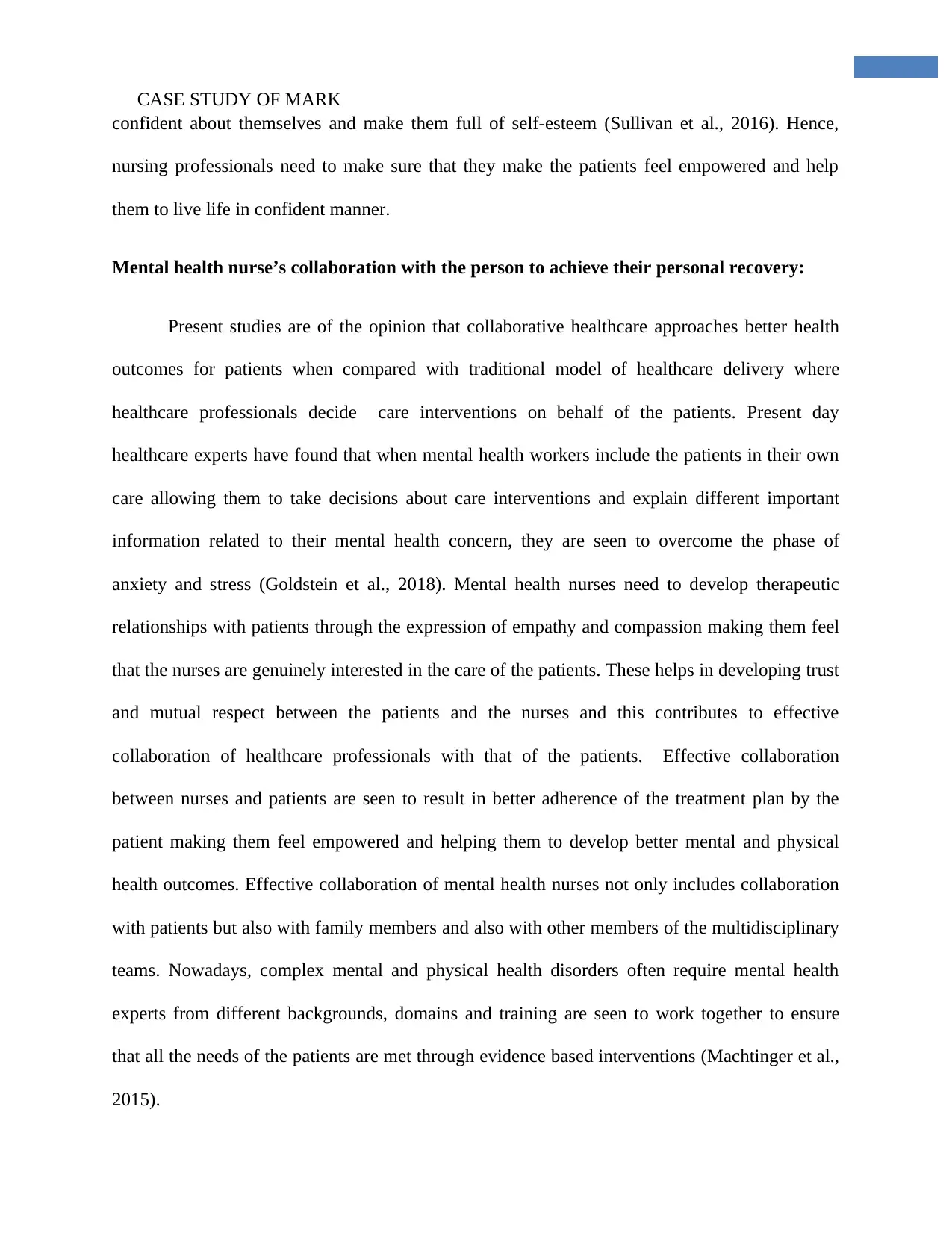
4
CASE STUDY OF MARK
confident about themselves and make them full of self-esteem (Sullivan et al., 2016). Hence,
nursing professionals need to make sure that they make the patients feel empowered and help
them to live life in confident manner.
Mental health nurse’s collaboration with the person to achieve their personal recovery:
Present studies are of the opinion that collaborative healthcare approaches better health
outcomes for patients when compared with traditional model of healthcare delivery where
healthcare professionals decide care interventions on behalf of the patients. Present day
healthcare experts have found that when mental health workers include the patients in their own
care allowing them to take decisions about care interventions and explain different important
information related to their mental health concern, they are seen to overcome the phase of
anxiety and stress (Goldstein et al., 2018). Mental health nurses need to develop therapeutic
relationships with patients through the expression of empathy and compassion making them feel
that the nurses are genuinely interested in the care of the patients. These helps in developing trust
and mutual respect between the patients and the nurses and this contributes to effective
collaboration of healthcare professionals with that of the patients. Effective collaboration
between nurses and patients are seen to result in better adherence of the treatment plan by the
patient making them feel empowered and helping them to develop better mental and physical
health outcomes. Effective collaboration of mental health nurses not only includes collaboration
with patients but also with family members and also with other members of the multidisciplinary
teams. Nowadays, complex mental and physical health disorders often require mental health
experts from different backgrounds, domains and training are seen to work together to ensure
that all the needs of the patients are met through evidence based interventions (Machtinger et al.,
2015).
CASE STUDY OF MARK
confident about themselves and make them full of self-esteem (Sullivan et al., 2016). Hence,
nursing professionals need to make sure that they make the patients feel empowered and help
them to live life in confident manner.
Mental health nurse’s collaboration with the person to achieve their personal recovery:
Present studies are of the opinion that collaborative healthcare approaches better health
outcomes for patients when compared with traditional model of healthcare delivery where
healthcare professionals decide care interventions on behalf of the patients. Present day
healthcare experts have found that when mental health workers include the patients in their own
care allowing them to take decisions about care interventions and explain different important
information related to their mental health concern, they are seen to overcome the phase of
anxiety and stress (Goldstein et al., 2018). Mental health nurses need to develop therapeutic
relationships with patients through the expression of empathy and compassion making them feel
that the nurses are genuinely interested in the care of the patients. These helps in developing trust
and mutual respect between the patients and the nurses and this contributes to effective
collaboration of healthcare professionals with that of the patients. Effective collaboration
between nurses and patients are seen to result in better adherence of the treatment plan by the
patient making them feel empowered and helping them to develop better mental and physical
health outcomes. Effective collaboration of mental health nurses not only includes collaboration
with patients but also with family members and also with other members of the multidisciplinary
teams. Nowadays, complex mental and physical health disorders often require mental health
experts from different backgrounds, domains and training are seen to work together to ensure
that all the needs of the patients are met through evidence based interventions (Machtinger et al.,
2015).
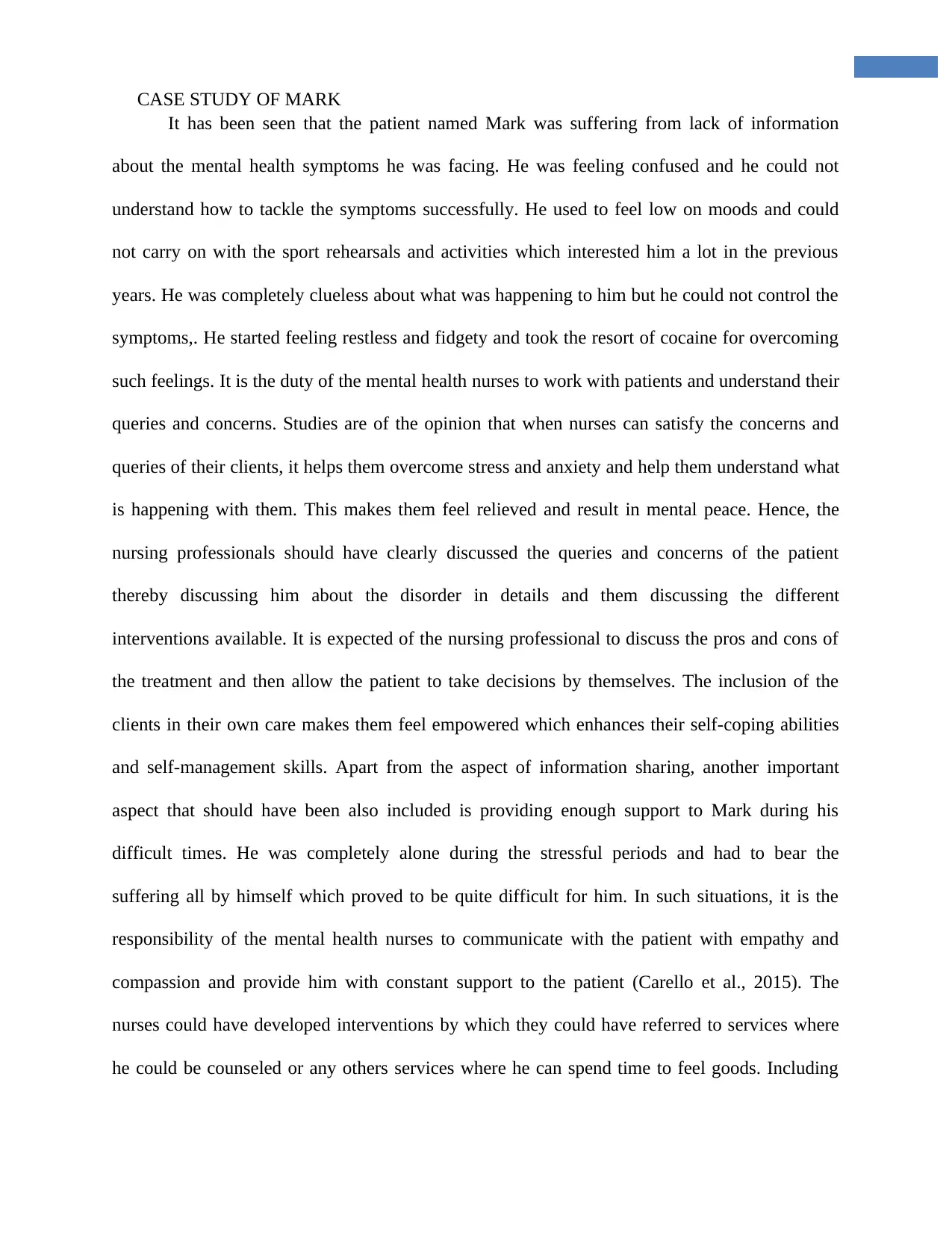
5
CASE STUDY OF MARK
It has been seen that the patient named Mark was suffering from lack of information
about the mental health symptoms he was facing. He was feeling confused and he could not
understand how to tackle the symptoms successfully. He used to feel low on moods and could
not carry on with the sport rehearsals and activities which interested him a lot in the previous
years. He was completely clueless about what was happening to him but he could not control the
symptoms,. He started feeling restless and fidgety and took the resort of cocaine for overcoming
such feelings. It is the duty of the mental health nurses to work with patients and understand their
queries and concerns. Studies are of the opinion that when nurses can satisfy the concerns and
queries of their clients, it helps them overcome stress and anxiety and help them understand what
is happening with them. This makes them feel relieved and result in mental peace. Hence, the
nursing professionals should have clearly discussed the queries and concerns of the patient
thereby discussing him about the disorder in details and them discussing the different
interventions available. It is expected of the nursing professional to discuss the pros and cons of
the treatment and then allow the patient to take decisions by themselves. The inclusion of the
clients in their own care makes them feel empowered which enhances their self-coping abilities
and self-management skills. Apart from the aspect of information sharing, another important
aspect that should have been also included is providing enough support to Mark during his
difficult times. He was completely alone during the stressful periods and had to bear the
suffering all by himself which proved to be quite difficult for him. In such situations, it is the
responsibility of the mental health nurses to communicate with the patient with empathy and
compassion and provide him with constant support to the patient (Carello et al., 2015). The
nurses could have developed interventions by which they could have referred to services where
he could be counseled or any others services where he can spend time to feel goods. Including
CASE STUDY OF MARK
It has been seen that the patient named Mark was suffering from lack of information
about the mental health symptoms he was facing. He was feeling confused and he could not
understand how to tackle the symptoms successfully. He used to feel low on moods and could
not carry on with the sport rehearsals and activities which interested him a lot in the previous
years. He was completely clueless about what was happening to him but he could not control the
symptoms,. He started feeling restless and fidgety and took the resort of cocaine for overcoming
such feelings. It is the duty of the mental health nurses to work with patients and understand their
queries and concerns. Studies are of the opinion that when nurses can satisfy the concerns and
queries of their clients, it helps them overcome stress and anxiety and help them understand what
is happening with them. This makes them feel relieved and result in mental peace. Hence, the
nursing professionals should have clearly discussed the queries and concerns of the patient
thereby discussing him about the disorder in details and them discussing the different
interventions available. It is expected of the nursing professional to discuss the pros and cons of
the treatment and then allow the patient to take decisions by themselves. The inclusion of the
clients in their own care makes them feel empowered which enhances their self-coping abilities
and self-management skills. Apart from the aspect of information sharing, another important
aspect that should have been also included is providing enough support to Mark during his
difficult times. He was completely alone during the stressful periods and had to bear the
suffering all by himself which proved to be quite difficult for him. In such situations, it is the
responsibility of the mental health nurses to communicate with the patient with empathy and
compassion and provide him with constant support to the patient (Carello et al., 2015). The
nurses could have developed interventions by which they could have referred to services where
he could be counseled or any others services where he can spend time to feel goods. Including
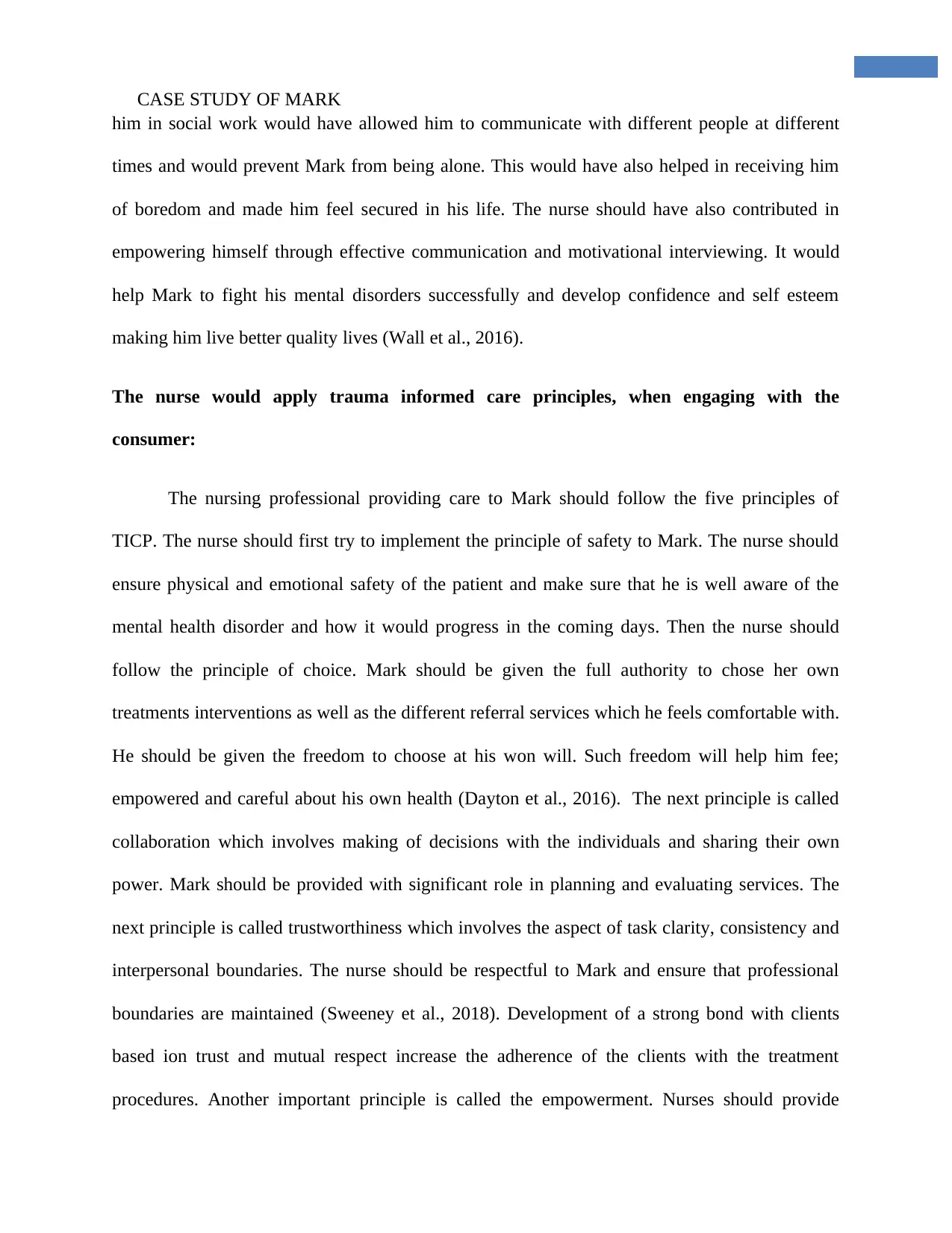
6
CASE STUDY OF MARK
him in social work would have allowed him to communicate with different people at different
times and would prevent Mark from being alone. This would have also helped in receiving him
of boredom and made him feel secured in his life. The nurse should have also contributed in
empowering himself through effective communication and motivational interviewing. It would
help Mark to fight his mental disorders successfully and develop confidence and self esteem
making him live better quality lives (Wall et al., 2016).
The nurse would apply trauma informed care principles, when engaging with the
consumer:
The nursing professional providing care to Mark should follow the five principles of
TICP. The nurse should first try to implement the principle of safety to Mark. The nurse should
ensure physical and emotional safety of the patient and make sure that he is well aware of the
mental health disorder and how it would progress in the coming days. Then the nurse should
follow the principle of choice. Mark should be given the full authority to chose her own
treatments interventions as well as the different referral services which he feels comfortable with.
He should be given the freedom to choose at his won will. Such freedom will help him fee;
empowered and careful about his own health (Dayton et al., 2016). The next principle is called
collaboration which involves making of decisions with the individuals and sharing their own
power. Mark should be provided with significant role in planning and evaluating services. The
next principle is called trustworthiness which involves the aspect of task clarity, consistency and
interpersonal boundaries. The nurse should be respectful to Mark and ensure that professional
boundaries are maintained (Sweeney et al., 2018). Development of a strong bond with clients
based ion trust and mutual respect increase the adherence of the clients with the treatment
procedures. Another important principle is called the empowerment. Nurses should provide
CASE STUDY OF MARK
him in social work would have allowed him to communicate with different people at different
times and would prevent Mark from being alone. This would have also helped in receiving him
of boredom and made him feel secured in his life. The nurse should have also contributed in
empowering himself through effective communication and motivational interviewing. It would
help Mark to fight his mental disorders successfully and develop confidence and self esteem
making him live better quality lives (Wall et al., 2016).
The nurse would apply trauma informed care principles, when engaging with the
consumer:
The nursing professional providing care to Mark should follow the five principles of
TICP. The nurse should first try to implement the principle of safety to Mark. The nurse should
ensure physical and emotional safety of the patient and make sure that he is well aware of the
mental health disorder and how it would progress in the coming days. Then the nurse should
follow the principle of choice. Mark should be given the full authority to chose her own
treatments interventions as well as the different referral services which he feels comfortable with.
He should be given the freedom to choose at his won will. Such freedom will help him fee;
empowered and careful about his own health (Dayton et al., 2016). The next principle is called
collaboration which involves making of decisions with the individuals and sharing their own
power. Mark should be provided with significant role in planning and evaluating services. The
next principle is called trustworthiness which involves the aspect of task clarity, consistency and
interpersonal boundaries. The nurse should be respectful to Mark and ensure that professional
boundaries are maintained (Sweeney et al., 2018). Development of a strong bond with clients
based ion trust and mutual respect increase the adherence of the clients with the treatment
procedures. Another important principle is called the empowerment. Nurses should provide
Paraphrase This Document
Need a fresh take? Get an instant paraphrase of this document with our AI Paraphraser
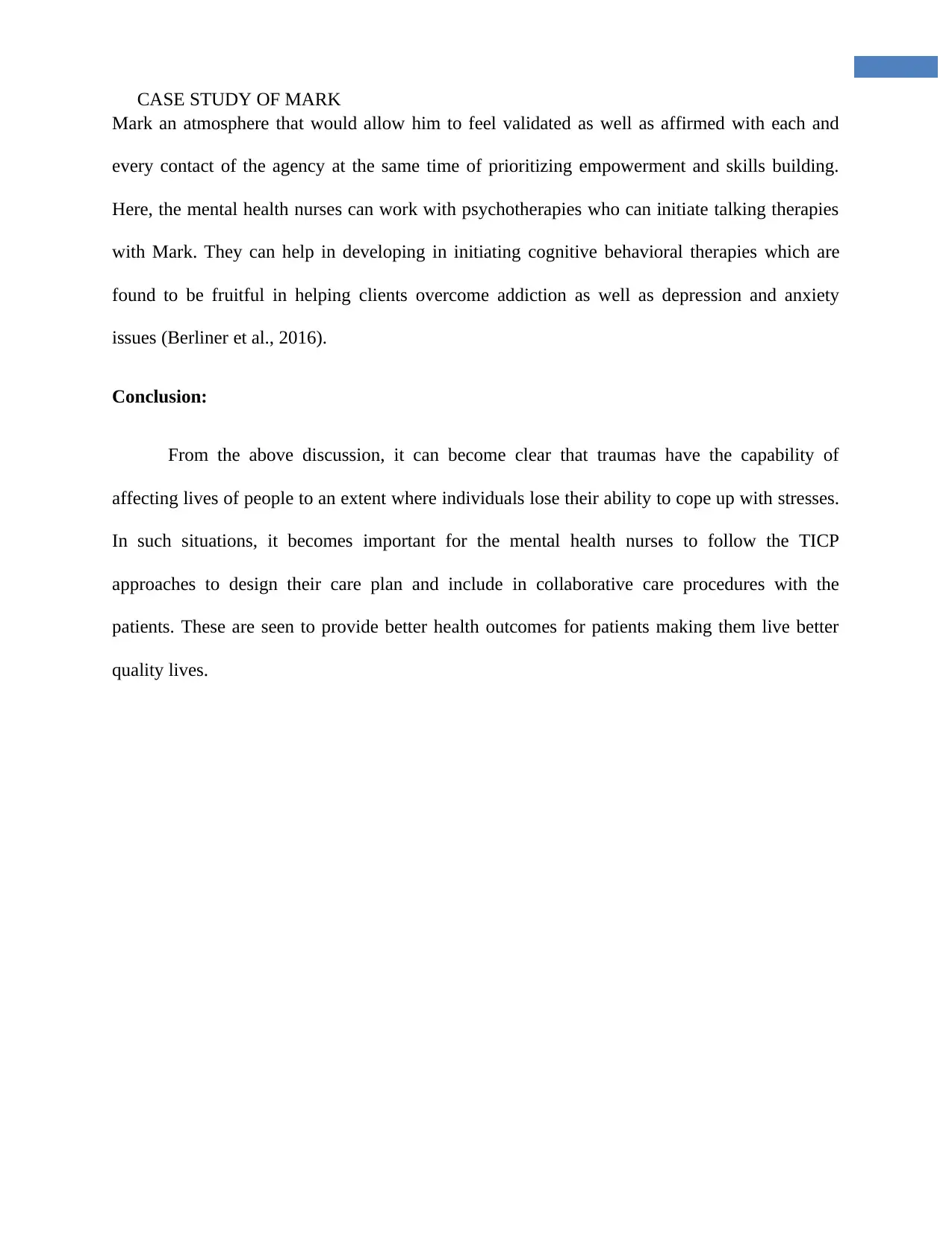
7
CASE STUDY OF MARK
Mark an atmosphere that would allow him to feel validated as well as affirmed with each and
every contact of the agency at the same time of prioritizing empowerment and skills building.
Here, the mental health nurses can work with psychotherapies who can initiate talking therapies
with Mark. They can help in developing in initiating cognitive behavioral therapies which are
found to be fruitful in helping clients overcome addiction as well as depression and anxiety
issues (Berliner et al., 2016).
Conclusion:
From the above discussion, it can become clear that traumas have the capability of
affecting lives of people to an extent where individuals lose their ability to cope up with stresses.
In such situations, it becomes important for the mental health nurses to follow the TICP
approaches to design their care plan and include in collaborative care procedures with the
patients. These are seen to provide better health outcomes for patients making them live better
quality lives.
CASE STUDY OF MARK
Mark an atmosphere that would allow him to feel validated as well as affirmed with each and
every contact of the agency at the same time of prioritizing empowerment and skills building.
Here, the mental health nurses can work with psychotherapies who can initiate talking therapies
with Mark. They can help in developing in initiating cognitive behavioral therapies which are
found to be fruitful in helping clients overcome addiction as well as depression and anxiety
issues (Berliner et al., 2016).
Conclusion:
From the above discussion, it can become clear that traumas have the capability of
affecting lives of people to an extent where individuals lose their ability to cope up with stresses.
In such situations, it becomes important for the mental health nurses to follow the TICP
approaches to design their care plan and include in collaborative care procedures with the
patients. These are seen to provide better health outcomes for patients making them live better
quality lives.
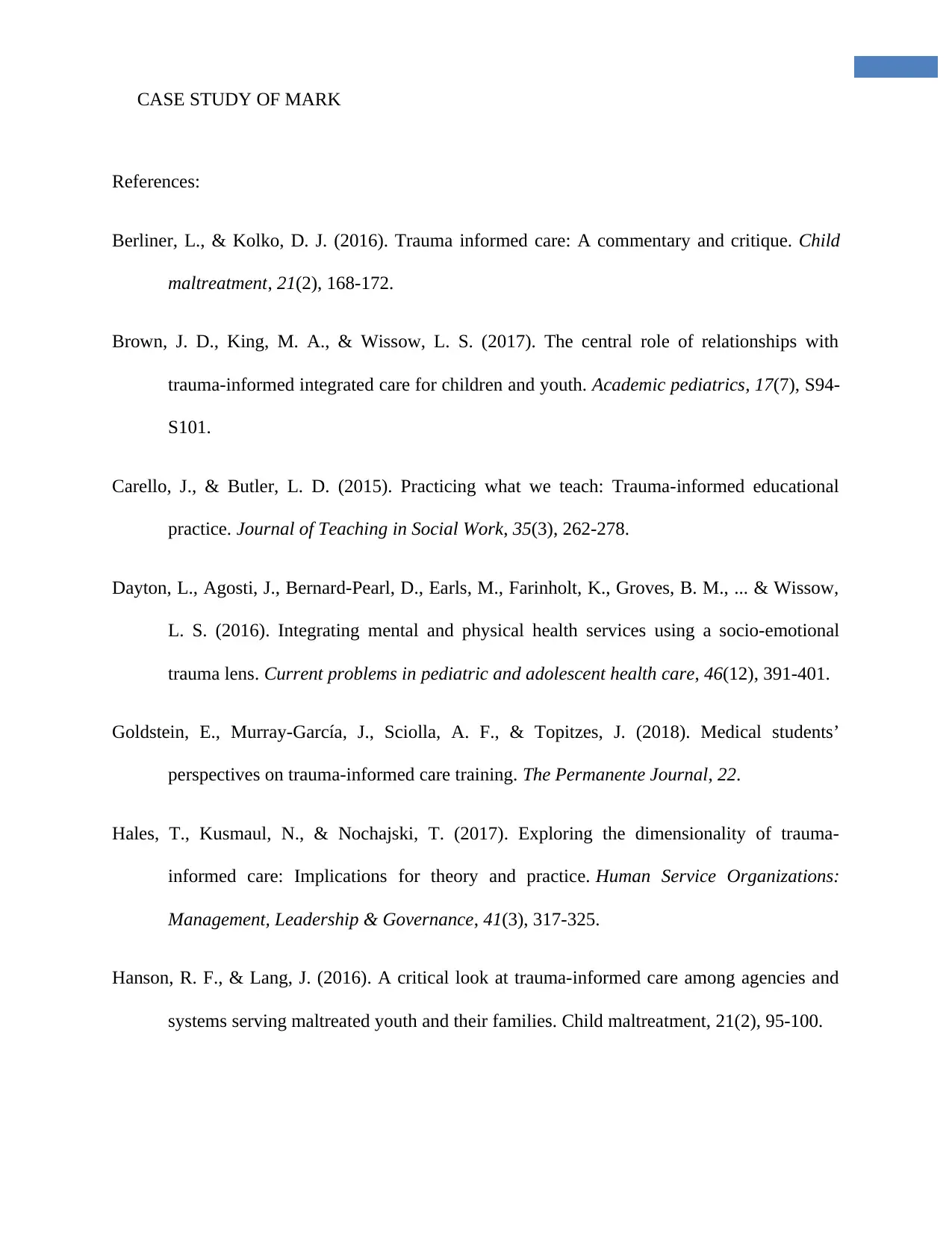
8
CASE STUDY OF MARK
References:
Berliner, L., & Kolko, D. J. (2016). Trauma informed care: A commentary and critique. Child
maltreatment, 21(2), 168-172.
Brown, J. D., King, M. A., & Wissow, L. S. (2017). The central role of relationships with
trauma-informed integrated care for children and youth. Academic pediatrics, 17(7), S94-
S101.
Carello, J., & Butler, L. D. (2015). Practicing what we teach: Trauma-informed educational
practice. Journal of Teaching in Social Work, 35(3), 262-278.
Dayton, L., Agosti, J., Bernard-Pearl, D., Earls, M., Farinholt, K., Groves, B. M., ... & Wissow,
L. S. (2016). Integrating mental and physical health services using a socio-emotional
trauma lens. Current problems in pediatric and adolescent health care, 46(12), 391-401.
Goldstein, E., Murray-García, J., Sciolla, A. F., & Topitzes, J. (2018). Medical students’
perspectives on trauma-informed care training. The Permanente Journal, 22.
Hales, T., Kusmaul, N., & Nochajski, T. (2017). Exploring the dimensionality of trauma-
informed care: Implications for theory and practice. Human Service Organizations:
Management, Leadership & Governance, 41(3), 317-325.
Hanson, R. F., & Lang, J. (2016). A critical look at trauma-informed care among agencies and
systems serving maltreated youth and their families. Child maltreatment, 21(2), 95-100.
CASE STUDY OF MARK
References:
Berliner, L., & Kolko, D. J. (2016). Trauma informed care: A commentary and critique. Child
maltreatment, 21(2), 168-172.
Brown, J. D., King, M. A., & Wissow, L. S. (2017). The central role of relationships with
trauma-informed integrated care for children and youth. Academic pediatrics, 17(7), S94-
S101.
Carello, J., & Butler, L. D. (2015). Practicing what we teach: Trauma-informed educational
practice. Journal of Teaching in Social Work, 35(3), 262-278.
Dayton, L., Agosti, J., Bernard-Pearl, D., Earls, M., Farinholt, K., Groves, B. M., ... & Wissow,
L. S. (2016). Integrating mental and physical health services using a socio-emotional
trauma lens. Current problems in pediatric and adolescent health care, 46(12), 391-401.
Goldstein, E., Murray-García, J., Sciolla, A. F., & Topitzes, J. (2018). Medical students’
perspectives on trauma-informed care training. The Permanente Journal, 22.
Hales, T., Kusmaul, N., & Nochajski, T. (2017). Exploring the dimensionality of trauma-
informed care: Implications for theory and practice. Human Service Organizations:
Management, Leadership & Governance, 41(3), 317-325.
Hanson, R. F., & Lang, J. (2016). A critical look at trauma-informed care among agencies and
systems serving maltreated youth and their families. Child maltreatment, 21(2), 95-100.
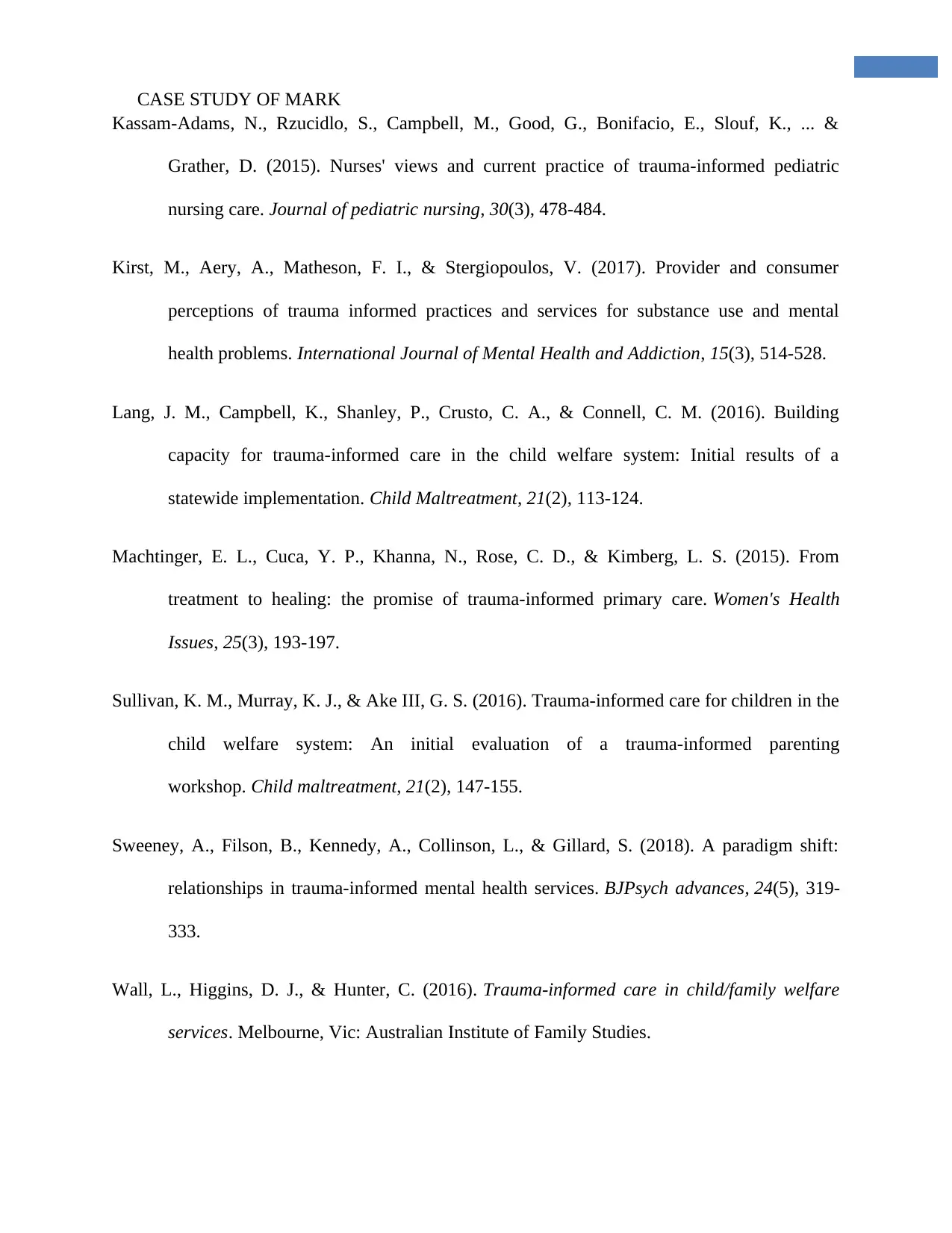
9
CASE STUDY OF MARK
Kassam-Adams, N., Rzucidlo, S., Campbell, M., Good, G., Bonifacio, E., Slouf, K., ... &
Grather, D. (2015). Nurses' views and current practice of trauma-informed pediatric
nursing care. Journal of pediatric nursing, 30(3), 478-484.
Kirst, M., Aery, A., Matheson, F. I., & Stergiopoulos, V. (2017). Provider and consumer
perceptions of trauma informed practices and services for substance use and mental
health problems. International Journal of Mental Health and Addiction, 15(3), 514-528.
Lang, J. M., Campbell, K., Shanley, P., Crusto, C. A., & Connell, C. M. (2016). Building
capacity for trauma-informed care in the child welfare system: Initial results of a
statewide implementation. Child Maltreatment, 21(2), 113-124.
Machtinger, E. L., Cuca, Y. P., Khanna, N., Rose, C. D., & Kimberg, L. S. (2015). From
treatment to healing: the promise of trauma-informed primary care. Women's Health
Issues, 25(3), 193-197.
Sullivan, K. M., Murray, K. J., & Ake III, G. S. (2016). Trauma-informed care for children in the
child welfare system: An initial evaluation of a trauma-informed parenting
workshop. Child maltreatment, 21(2), 147-155.
Sweeney, A., Filson, B., Kennedy, A., Collinson, L., & Gillard, S. (2018). A paradigm shift:
relationships in trauma-informed mental health services. BJPsych advances, 24(5), 319-
333.
Wall, L., Higgins, D. J., & Hunter, C. (2016). Trauma-informed care in child/family welfare
services. Melbourne, Vic: Australian Institute of Family Studies.
CASE STUDY OF MARK
Kassam-Adams, N., Rzucidlo, S., Campbell, M., Good, G., Bonifacio, E., Slouf, K., ... &
Grather, D. (2015). Nurses' views and current practice of trauma-informed pediatric
nursing care. Journal of pediatric nursing, 30(3), 478-484.
Kirst, M., Aery, A., Matheson, F. I., & Stergiopoulos, V. (2017). Provider and consumer
perceptions of trauma informed practices and services for substance use and mental
health problems. International Journal of Mental Health and Addiction, 15(3), 514-528.
Lang, J. M., Campbell, K., Shanley, P., Crusto, C. A., & Connell, C. M. (2016). Building
capacity for trauma-informed care in the child welfare system: Initial results of a
statewide implementation. Child Maltreatment, 21(2), 113-124.
Machtinger, E. L., Cuca, Y. P., Khanna, N., Rose, C. D., & Kimberg, L. S. (2015). From
treatment to healing: the promise of trauma-informed primary care. Women's Health
Issues, 25(3), 193-197.
Sullivan, K. M., Murray, K. J., & Ake III, G. S. (2016). Trauma-informed care for children in the
child welfare system: An initial evaluation of a trauma-informed parenting
workshop. Child maltreatment, 21(2), 147-155.
Sweeney, A., Filson, B., Kennedy, A., Collinson, L., & Gillard, S. (2018). A paradigm shift:
relationships in trauma-informed mental health services. BJPsych advances, 24(5), 319-
333.
Wall, L., Higgins, D. J., & Hunter, C. (2016). Trauma-informed care in child/family welfare
services. Melbourne, Vic: Australian Institute of Family Studies.
Secure Best Marks with AI Grader
Need help grading? Try our AI Grader for instant feedback on your assignments.
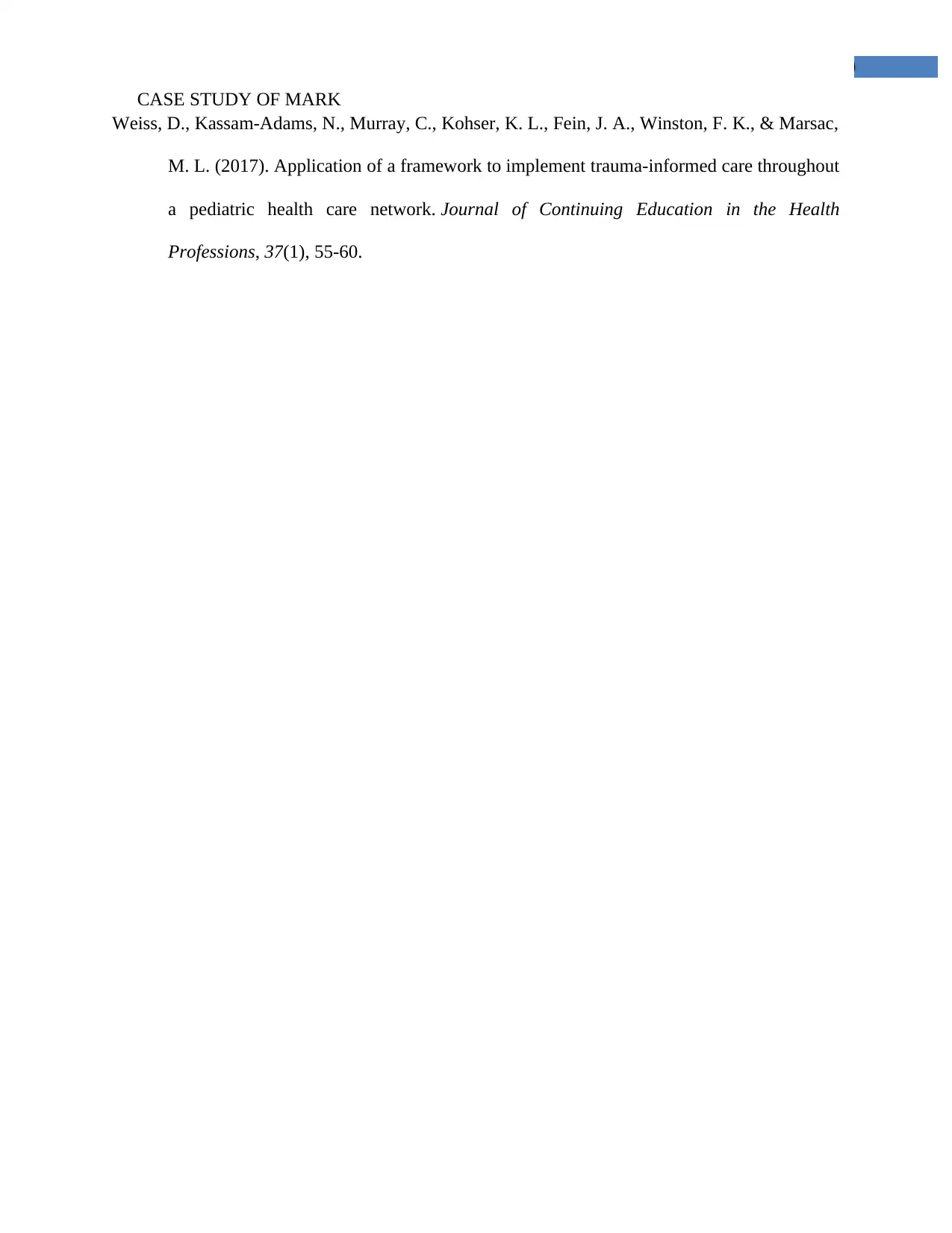
10
CASE STUDY OF MARK
Weiss, D., Kassam-Adams, N., Murray, C., Kohser, K. L., Fein, J. A., Winston, F. K., & Marsac,
M. L. (2017). Application of a framework to implement trauma-informed care throughout
a pediatric health care network. Journal of Continuing Education in the Health
Professions, 37(1), 55-60.
CASE STUDY OF MARK
Weiss, D., Kassam-Adams, N., Murray, C., Kohser, K. L., Fein, J. A., Winston, F. K., & Marsac,
M. L. (2017). Application of a framework to implement trauma-informed care throughout
a pediatric health care network. Journal of Continuing Education in the Health
Professions, 37(1), 55-60.
1 out of 11
Related Documents
Your All-in-One AI-Powered Toolkit for Academic Success.
+13062052269
info@desklib.com
Available 24*7 on WhatsApp / Email
![[object Object]](/_next/static/media/star-bottom.7253800d.svg)
Unlock your academic potential
© 2024 | Zucol Services PVT LTD | All rights reserved.




